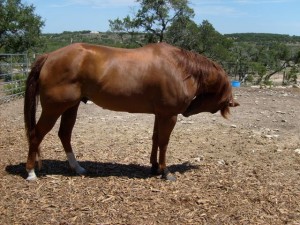 Horse symptoms come in 2 categories, acute and chronic. We tend to get more worried about the acute symptoms such as severe lameness, colic in horses or fever. These horse symptoms are all red flags that something major is wrong that may need immediate, aggressive intervention.
Horse symptoms come in 2 categories, acute and chronic. We tend to get more worried about the acute symptoms such as severe lameness, colic in horses or fever. These horse symptoms are all red flags that something major is wrong that may need immediate, aggressive intervention.
Acute horse symptoms often come on quickly, are intense and cause the horse major distress. Acute horse symptoms mean the horse’s natural defense mechanisms have been compromised. For example, acute lameness, that is not an injury, often occurs when the body is unable to clear toxins. This may show up as a hoof abscess or painful swelling around a joint.
Colic in horses generally occurs when the healthy bacteria in the gut are out of balance with pathogenic bacteria. This faulty balance or dysbiosis allows for extra gas formation in the gut or decreased motility leading to impaction.
A fever generally means a foreign invader has breached the immune defenses and set up shop in the horse’s body. Just because a horse is showing acute symptoms you do not have to jump in with immediate, aggressive treatment but you need to get ready to do so if needed. Nutritional support is often inadequate to overcome acute horse symptoms. Because the body is already compromised or out of balance you may need homeopathic remedies, herbs or even drugs to address acute symptoms.
The other types of horse symptoms are the chronic symptoms. These are things like runny eyes, cracked hooves or a dull looking hair coat. These horse symptoms may be overlooked because they have been present for so long they are accepted as usual for that horse. There is some danger in this way of thinking because even if a symptom is usual that does not make it normal.
When chronic horse symptoms appear it is like the check engine light coming on in your car. If you car appears to be running fine it is easy to ignore the light but the prudent course is to find out why the light came on and correct the problem before it gets worse. The good news is that chronic symptoms usually respond very well to nutritional support.
For instance, runny eyes can be caused by a deficiency of beta carotene. Beta carotene is the precursor for vitamin A and it is found in green foods such as fresh grass. If your horse does not have access to fresh green grass you may want to give him blue green algae which is another good source of beta carotene. Allowing a deficiency of beta carotene to go unattended could lead to a more serious eye condition such as uveitis.
Cracked hooves and a dull coat could be a sign of internal parasites or a simple vitamin/mineral deficiency. I much prefer whole food sources of vitamins and minerals over formulated supplements. Again I like blue green algae to supply a wide range of easily assimilated vitamins and minerals.
So the answer is to be worried about acute and chronic horse symptoms. Be prepared to step in and support the horse with homeopathic remedies, herbs or drugs for acute symptoms and nutrition for chronic symptoms. Do not accept any horse symptom as usual. Madalyn
For more information about Holistic Horse care check out Holistic Horsekeeping